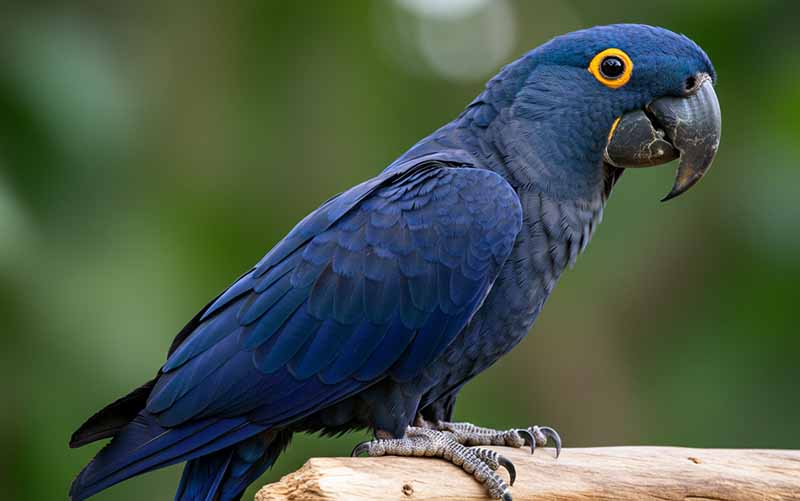Few creatures in the animal kingdom are as breathtaking as the blue macaw, also known as the hyacinth macaw (Anodorhynchus hyacinthinus). With their vibrant cobalt feathers, large size, and intelligent personalities, these birds captivate everyone who encounters them. But behind their beauty lies a high-maintenance companion that requires space, time, and dedication.
In this guide, you’ll learn what it really takes to care for a blue macaw, whether you’re a curious bird lover or seriously considering adoption.
Meet the Blue Macaw
The blue macaw is the largest flying parrot species in the world, growing up to 40 inches (1 meter) in length with a wingspan of over 4 feet (1.2 meters). Native to parts of Brazil, Bolivia, and Paraguay, these birds are famous for their vibrant blue plumage, yellow eye rings, and strong, curved black beaks.
They are social, intelligent, and capable of forming deep bonds with their human caregivers — which is part of what makes them so appealing as exotic pets.
Are Blue Macaws Legal to Own?
Blue macaws are classified as vulnerable on the IUCN Red List due to habitat loss and illegal trafficking. However, birds bred in captivity by licensed breeders may be legally owned in some countries.
Before adopting, check:
- CITES permits (Convention on International Trade in Endangered Species)
- Local or national wildlife laws
- Import/export regulations
- Breeder accreditation and documentation
In the U.S., ownership is legal in many states but regulated. In the EU, certain permits and veterinary standards must be met. Always ensure your bird comes from an ethical, legal source.
What to Expect: Life with a Blue Macaw
Blue macaws are not beginner birds. They are intelligent, demanding, and incredibly long-lived — with a lifespan of 50 to 60 years, and some even reaching 80+ in captivity.
Key Characteristics:
- Highly social and bond-driven
- Very vocal, with loud, piercing calls
- Can mimic sounds and basic words
- Need constant mental and physical stimulation
- Require large enclosures and out-of-cage time daily
If you’re not ready to treat a bird like a member of the family, a blue macaw is not for you.
Housing: Big Bird, Big Space
Blue macaws need more than just a cage — they require an aviary-level habitat.
Minimum Cage Dimensions:
- 6 ft x 6 ft x 8 ft (1.8 x 1.8 x 2.4 meters) — the bigger, the better
- Bar spacing: 1.25 to 1.5 inches
- Made from strong metal (they can destroy flimsy materials)
Free-flying time outside the cage is essential. They need at least 2–4 hours daily to stretch their wings, explore, and interact with you.
Provide perches of varying sizes and textures, toys, ropes, and climbing structures to simulate natural movement.
Diet and Nutrition
A proper diet is essential to maintain a macaw’s bright feathers, strong beak, and overall health.
Recommended Diet:
- High-quality pellets designed for large parrots
- Fresh fruits: apples, bananas, mangoes, berries
- Fresh vegetables: carrots, leafy greens, bell peppers, squash
- Occasional nuts (especially Brazil nuts, macadamias, and walnuts — their beaks are made for them!)
- Clean water, changed daily
Avoid:
- Avocado, chocolate, caffeine, alcohol (all toxic)
- Excessive seed-based diets — leads to malnutrition and obesity
- Salty, sugary, or processed human foods
Offering a varied diet prevents boredom and nutritional deficiencies.
Behavior and Mental Stimulation
Macaws are highly intelligent — often compared to a 3- to 5-year-old human child in terms of mental capacity. Without proper stimulation, they can become bored, aggressive, or depressed.
Provide Daily:
- Puzzle feeders
- Interactive toys
- Trick training (they can learn many commands)
- Music or bird-safe videos
- Social time with humans or other parrots
They thrive on attention and can become destructive or self-mutilating (feather plucking) if neglected.
Vocalization: The Noise Factor
Let’s be clear — blue macaws are LOUD. Their calls can reach 100+ decibels, which is comparable to a chainsaw or rock concert.
They scream:
- To greet you
- When excited
- Out of boredom
- At dawn and dusk (like a natural alarm clock)
If you live in an apartment or have close neighbors, this may be a major issue. Soundproofing and consistent training can help, but volume is part of the package.
Handling and Socialization
Blue macaws crave interaction and often form deep bonds with one or two people. With consistent, gentle handling, they can be affectionate, cuddly, and even playful.
Tips for Bonding:
- Start slowly — allow them to approach you
- Use positive reinforcement (treats and praise)
- Establish a consistent routine
- Avoid forcing contact
- Watch for body language (raised feathers, eye pinning, lunging)
Respect their moods and never punish screaming — it reinforces negative behavior. Instead, redirect their attention or change the environment.
Veterinary Care and Health
Regular visits to an avian veterinarian are a must. Macaws are prone to specific health issues, including:
- Psittacosis (parrot fever)
- Beak and feather disease
- Obesity or vitamin A deficiency
- Respiratory infections
- Feather-plucking due to stress or boredom
Annual checkups, blood work, and nutritional assessments will help ensure a long, healthy life.
Cleaning and Maintenance
Parrots are messy. Be prepared to clean daily:
- Droppings and food scraps
- Molted feathers
- Chewed-up toys and perches
- Water and food bowls
A full cage cleaning should be done weekly, and deep sanitizing at least monthly. Place mats or plastic sheeting under the cage to protect floors.
Pros and Cons of Blue Macaws
Pros:
- Stunning visual appeal
- Deep, loyal bond with owners
- Highly intelligent and trainable
- Long lifespan
- Social, interactive personality
Cons:
- Very loud and vocal
- Require a huge amount of space
- High cost (purchase + lifelong care)
- Need daily mental and physical stimulation
- Can become aggressive or depressed if neglected
Should You Get a Blue Macaw?
Only if you’re ready to make a lifelong commitment. These birds are not accessories — they are intelligent companions that require structure, patience, and consistent care.
Ask yourself:
- Can I dedicate time every day for the next 50 years?
- Do I have space for a massive enclosure?
- Am I okay with loud noise?
- Do I have access to an avian vet?
- Am I financially ready for a long-term exotic pet?
If you can confidently answer yes, you may be a great candidate for owning one of nature’s most majestic parrots.
A Feathered Legacy
Blue macaws are a dream pet for those who are fully prepared for the responsibility. Their beauty, intelligence, and companionship are unmatched in the avian world — but they are not “easy” pets by any stretch.
If you’re committed to giving them the space, time, enrichment, and love they deserve, you’ll be rewarded with a lifelong friend who will brighten your days with color, personality, and unforgettable moments.

I specialize in transforming homes into pet havens. I offer practical tips on creating safe environments, selecting stimulating toys, designing enriching spaces for pets, risk prevention strategies and daily care routines that prioritize animal well-being. Discover science-based solutions for happier, healthier companions.

